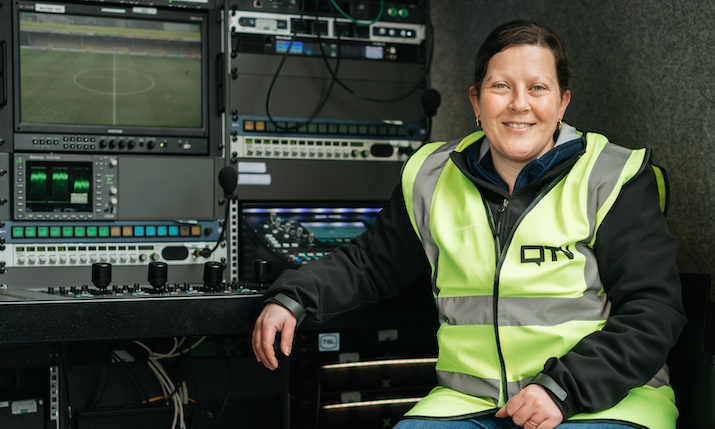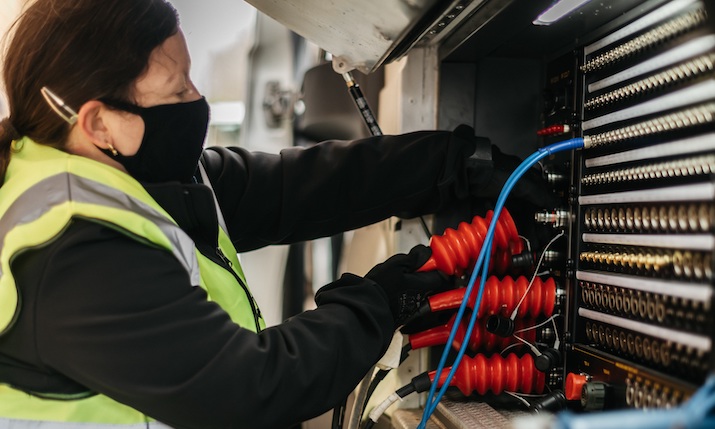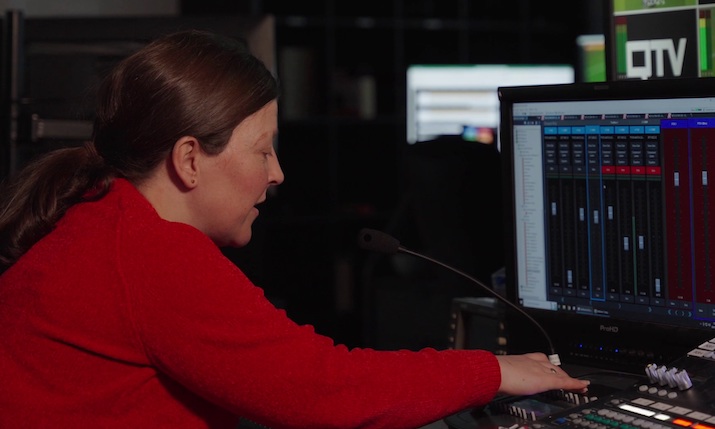Problem solver: QTV senior technical manager Julie Robinson talks excitement, resilience and determination

Robinson: ‘OB work, particularly OB engineering, is not for the faint of heart’
By Julie Robinson, QTV senior technical manager
I often get asked what drew me into a career in live sport. I have to put my hand up and be honest; it’s not the sport that draws me into this job. I like participating in some sports, but I’m not a particularly big viewer of sports. What draws me in is a keen interest in problem solving, thinking on my feet and technical innovation, and live sports is an area of the broadcasting industry that seems to be thriving on technical innovation right now.
It’s such an interesting time with remote productions, 5G, artificial intelligence (AI), and the rest. There are so many newly developing ways of covering outside broadcasts that are being explored right now. It’s mind blowing just thinking about how different coverage is now compared to when I first began 23 years ago, and it seems to be changing dramatically at the moment. I can’t wait to see where we are in another few years!
I’ve been lucky enough to work on some very big sporting events over the course of my career – Champions League Football, World Cup Qualifiers, Six Nations Rugby, Scottish Snooker Masters, the Golf Open, and an awful lot more in between. However, for me, the coolest event that I got to work on was the Mountain Biking Championships at Fort William.
I really enjoyed the beautiful setting around Ben Nevis, and it was great fun to watch. I walked around the course one day and was fascinated with some of the camera positioning and the can-do attitudes of the participants. That was a terrific few days for me.
Male-dominated role
One of the biggest challenges over the course of my career has perhaps been the occasional loneliness. I work in a very male dominated role, which as a younger woman definitely made me feel that I had to work harder to prove myself. It’s easy to slip into feeling uncomfortable or not good enough when you feel different. Even in a crew full of lovely and very supportive men, you still miss the chat and buzz you get from talking to someone who completely understands where you’re coming from.
I think over the years I just learned to feel more comfortable with who I was and less bothered about what others thought of me. That’s not to say I don’t still occasionally feel a little lonely when I’m on a shift as the only woman; I’ve gone from being a younger woman working among older men, to being an older woman working among younger men. I’m actually really struggling to think which one feels more awkward at times! I think the main difference is that I’ve now gotten a lot better at pushing past those feelings and not taking them home with me at night.

Working at the OB tailboard
What advice would I give to other women looking to move into a role like mine? I think the industry has changed a lot since I first started out. Attitudes have shifted and it’s now much more comfortable for a woman to be working in sports broadcasting, but you will still more often than not find that you’re the only woman in the room.
You will also still come across the occasional old-fashioned opinion, so you have to be able to stand up for yourself, but for the most part, you don’t feel like an outsider anymore.
Never a dull moment
OB work, particularly OB engineering, is not for the faint of heart, however. It’s hard work, both physically and mentally. The resilience and determination that you need to keep going can be tough, but it’s a great job for anyone who, like me, is a puzzle addict and likes to solve problems. You also get to travel, and one of my favourite parts of the job is being allowed to go behind the scenes in some very cool places!
It’s certainly never dull, that’s for sure.
For me, possibly the most challenging thing about working in live sport today (certainly in the technical craft side, anyway) is the squeezing of budgets without the lowering of expectations.
Most people are used to seeing high-end broadcasting these days with the World Cup, Olympics, etc, and that sets a general expectation about what you should be seeing when you watch live sports. However, very few can afford that.
“The most challenging thing about working in live sport today (certainly in the technical craft side, anyway) is the squeezing of budgets without the lowering of expectations”
What that means for the technical craft operations side is that you’re generally expected to do a lot more, with a much smaller crew and much cheaper equipment. I like the challenge, but it puts a lot of pressure on both the people and the technology.
Luckily, we have a super team here at QTV, all of whom work at an incredibly high level, but it can be frustrating for them to hear criticism of coverage or quality when they already feel that they’ve produced above and beyond what should have been expected at that budget.
Where it all began
I hadn’t really considered broadcasting as a career until I moved from Aberdeen to Glasgow to go to university. I was studying a combined electronics with music degree, and ideally wanted to go into sound work in the theatre.
I stayed on the university campus in the West End, though, and would frequently walk back and forth past the old BBC Scotland premises at Queen Margaret Drive. I remember the first time I saw the big logo on the side of the building and realised what it was… I was blown away with it being right there on my doorstep and told myself I was going to work there one day!
At the University of Glasgow I gained a 2:1 Honours Bachelor of Engineering degree in Electronics with Music. In April 2000 while I was studying for my final year exams, my boyfriend (now husband) brought home a newspaper clipping with an advert for a traineeship at BBC Scotland. I was so excited!
I applied for the trainee audio assistant position and went through a fairly gruelling three- to four-month interview process with group discussion exercises, spatial awareness and maths testing, practical equipment tests and a formal interview, all while studying for my final exams at university. It was worth it, though, as I got accepted as a trainee vision engineer (which I didn’t know was a thing!) and began in September that same year.
The traineeship at BBC Scotland was my first full-time job. During the lengthy interview process I thought I was being interviewed as an audio assistant, but unbeknown to me, the BBC had thought I would make a good vision engineer; after the formal interview I really thought I’d messed it up as I didn’t know many of the answers to their questions, but I ploughed on regardless and answered everything positively, stating that even though I didn’t know, I was a very quick learner and was super keen so would make the effort to pick it up.
Years later I was told by my manager that it was that attitude that had sold me to them! After I started the job and had an induction, I was sent to the BBC Wood Norton training facility for six weeks, before I came back up to Glasgow to begin the traineeship. My first few months involved working exclusively in the smaller studio on the Evening News, Newnight and Sportscene, and out on OBs for regular weekend football and rugby. It was immensely exciting!
I felt very special and honoured to have been picked as one of eight trainees out of around 1,500 applicants. It probably made me quite big headed and a little arrogant in the early days of my career, though. I’d like to think that I’m a little more levelheaded now… I hope!
Luck and hard work
My progression into broadcasting was extremely lucky and very privileged. I started my career at the BBC just after I turned 22. I’m often told how lucky I am, though I do like to remind myself that I put a lot of hard work in at school and university first, which must have helped a little. I still struggle with imposter syndrome a lot, though.
Right from the beginning of my career, the most common and frequent programming that I would work on was sport, both in the studio and out on OBs – football, rugby, golf, shinty, athletics, snooker, bowls, curling, etc – and because I was at the BBC it was all at the highest levels played in Scotland. As I moved along in my career, I began working more in lighting and high-end racks on light entertainment, children’s, comedy, music and more, but even during the quiet spells for everything else, there was always a constant flow of sports programming, which is by far the staple diet for broadcasters, and the one that keeps the highest percentage of technical craft operators in a job.
Changing times
During the pandemic, the opportunity for redundancy came up at the BBC and I volunteered. I was feeling quite stagnant, as it had been 20 years and I was keen to get out and try something new. Gareth Gordon, a colleague that I had worked with at the BBC for many years – who was at that time freelance, had heard that I was leaving and spoke to me about a company called QTV that he was in talks with about a permanent position. The company sounded very exciting and on the cusp of extensive growth.
I met with the CEO Jack McGill, then after leaving the BBC I worked freelance for QTV (as well as some other companies) for a couple of months. I was then offered a three-month contract and after that, a permanent position in the company.
I took the job at QTV for a couple of reasons. Firstly, I really liked everybody at the company, at every level, top to bottom. There was a really inclusive and close family feel among all of the staff that felt very comfortable to me.

Predominantly, however, I really loved the exciting pace and stage of growth that the company was at. They were just about to embark upon the introduction of remote production operations to the Professional Football League in Scotland, and the technical exploration and problem solving that I was being presented with every day were both stimulating and challenging. I really enjoyed that. I also fully appreciated the ambition, drive and ethos of the company.
Starting my new job at QTV felt like a very steep and challenging learning curve for me. Although I had worked in vision for 20 years already, it had been with the same company and the same set ups. At QTV, I felt like I was actively and instantly encouraged to spread my wings and try many other roles, too, which was a big change of pace for me. I was being handed huge amounts of responsibility, often in areas that I hadn’t worked in for many years since taking a step back to have children, like audio, creative lighting and OB guaranteeing.
I had to very quickly learn about many new pieces of technology and a whole host of new ways of working. I also got to be very closely involved in forming a lot of the new processes, which was incredibly satisfying. It was a huge shift of everything for me, but I very much appreciated the change and the extremely high expectations that were being put upon me.
I think the hardest aspect of my job (at the moment) is the pace at which we work. We are at a very critical stage of development so the amount of work that we are getting, the timescales in which we are working, and the shortage of staff who can operate in those higher responsibility roles, can all be a little difficult to sustain.
Yet the aspects of my job that constitute the most enjoyable for me are – funnily enough – all of the things that I’ve just listed as the hardest aspects of the job! I do really enjoy how challenging and demanding it can be. It makes it more rewarding when we succeed.
Growing business
Over the last two years QTV as a company has grown exponentially, and as the company grows, my role here changes with it. We now have almost double the number of staff compared to when I first started at the beginning of 2021. We also have 10 OB vehicles now, compared to the three that we had back then.
On top of that, two years ago, QTV was just in the process of planning out how to get started with remote productions, whereas now I think it’s safe to say that we’re well established; we have a fantastic new facility and plans for our fourth remote OB vehicle to be fitted out shortly. With the VAR contract now with the Scottish Professional Football League too, I frequently work as technical manager across five incoming football matches at the same time.
In just two short years, QTV has come a long way, and as a result, so have I. We already have some very exciting expansion plans in motion for this summer, so 2023 is looking set to be just as exciting as 2022.
QTV is working on some very interesting technical projects right now. Our CTO Gareth Gordon has been working very hard to push the company in some extremely innovative new directions. He has been working closely with 5G developers on cableless camera systems which (in time) could completely revolutionise how we rig large stadiums.
Our superbly strong engineering team have also been exploring new ways to bring remote productions to currently unconnected venues utilising Layer 2 networking. We are also trying to open up the doors for more and more clients who perhaps don’t have the budget for larger scale OBs by being creative about how we approach vMix productions and streaming.
I genuinely feel that QTV is continually pushing the envelope and finding new ways to bring broadcast accessibility to smaller, more niche sporting events. It feels incredible to be a part of this team.
